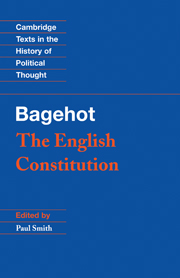Book contents
- Frontmatter
- Contents
- Editor's introduction
- Principal events in Bagehot's life
- Note on the text and annotation
- The English Constitution
- I The Cabinet
- II The Prerequisites of Cabinet Government, and the Peculiar Form Which They Have Assumed in England
- III The Monarchy
- IV The Monarchy (continued)
- V The House of Lords
- VI The House of Commons
- VII On Changes of Ministry
- VIII Its Supposed Checks and Balances
- IX Its History, and the Effects of That History – Conclusion
- Introduction to the Second Edition (1872)
- Biographical notes on persons mentioned in the text
- Bibliographical note
- Index
- Title in the series
VI - The House of Commons
Published online by Cambridge University Press: 05 June 2012
- Frontmatter
- Contents
- Editor's introduction
- Principal events in Bagehot's life
- Note on the text and annotation
- The English Constitution
- I The Cabinet
- II The Prerequisites of Cabinet Government, and the Peculiar Form Which They Have Assumed in England
- III The Monarchy
- IV The Monarchy (continued)
- V The House of Lords
- VI The House of Commons
- VII On Changes of Ministry
- VIII Its Supposed Checks and Balances
- IX Its History, and the Effects of That History – Conclusion
- Introduction to the Second Edition (1872)
- Biographical notes on persons mentioned in the text
- Bibliographical note
- Index
- Title in the series
Summary
The dignified aspect of the House of Commons is altogether secondary to its efficient use. It is dignified: in a government in which the most prominent parts are good because they are very stately, any prominent part, to be good at all, must be somewhat stately. The human imagination exacts keeping in government as much as in art; it will not be at all influenced by institutions which do not match with those by which it is principally influenced. The House of Commons needs to be impressive, and impressive it is: but its use resides not in its appearance, but in its reality. Its office is not to win power by awing mankind, but to use power in governing mankind.
The main function of the House of Commons is one which we know quite well, though our common constitutional speech does not recognise it. The House of Commons is an electoral chamber; it is the assembly which chooses our president. Washington and his fellow-politicians contrived an electoral college, to be composed (as was hoped) of the wisest people in the nation, which, after due deliberation, was to choose for President the wisest man in the nation. But that college is a sham; it has no independence and no life. No one knows, or cares to know, who its members are. They never discuss, and never deliberate. They were chosen to vote that Mr Lincoln be President, or that Mr Breckenridge be President; they do so vote, and they go home.
- Type
- Chapter
- Information
- Bagehot: The English Constitution , pp. 94 - 121Publisher: Cambridge University PressPrint publication year: 2001



